一般现在时的讲练
一般现在时、一般过去时、现在进行时、一般将来时语法讲练

____________________________________________________________________________________________________________________________________________________________________熟练掌握四种时态一般现在时态一般现在时: 表示现阶段经常或习惯性发生的动作或存在的状态,或说明主语的特征。
1)常用时间状语:often 经常,usually通常,always 总是,every每个,sometimes 有时,at …在几点钟,once / twice a week 一周一次/两次They go to the Palace Museum once a year. 他们每年去一次故宫。
They often discuss business in the evening . 他们经常在晚上谈生意。
2)表示客观真理,事实,人得技能或存在的状态。
如:The earth goes around the sun. 地球绕着太阳转。
3)表示十分确定会发生(或安排好的事情)或按照时间表进行的事情,用一般现在表示将来,句子中可以有表示将来的时间状语。
如:The train for Hankou leaves at 8:00 in the morning.去往汉口的列车上午8点开。
现在进行时.现在进行时的定义:现在进行时表示现在或当前一般时间正在进行的动作.可以表示有计划的未来.现在进行时的基本用法:A. 表示现在( 指说话人说话时) 正在发生的事情.例:We are waiting for you.B. 习惯进行:表示长期的或重复性的动作,说话时动作未必正在进行.例:Mr. Green is writing another novel.(说话时并未在写,只处于写作的状态.)例:She is learning piano under Mr. Smith.C.已经确定或安排好的将来活动I'm leaving for a trek in Nepal next week.(已经安排了)we're flying to Paris tomorrow.(票已经拿到了)【No. 1】现在进行时的应用在实际运用时,现在进行时常用以下几种情况:(1)当句子中有now时,常表示动作正在进行,这时要用现在进行时.如:They are playing basketball now.现在他们正在打篮球.(2)以look, listen开头的句子,提示我们动作正进行,这时要用现在进行时.如:Listen!She is singing an English song.听,她正在唱英语歌.(3)表示当前一段时间或现阶段正在进行的动作,且此时有this week, these days等时间状语,这时常用现在进行时.如:We are making model planes these days.这些天我们在做飞机模型.(4)描述图片中的人物的动作,也为了表达更生动.此时也常用现在进行时.如:Look at the picture. The children are flying kites in the park.看这幅图,那些孩子正在公园放风筝.一般将来时态一般将来时:表示在将来某个时间要发生的动作或存在的状态。
(完整版)大学一般现在时讲解及练习题
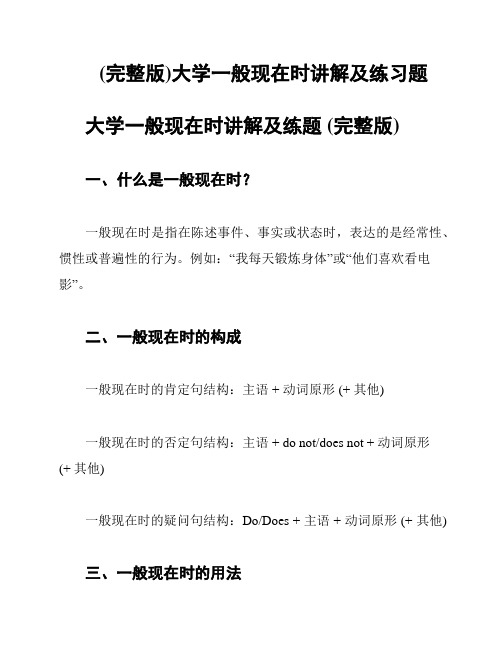
(完整版)大学一般现在时讲解及练习题大学一般现在时讲解及练题 (完整版)一、什么是一般现在时?一般现在时是指在陈述事件、事实或状态时,表达的是经常性、惯性或普遍性的行为。
例如:“我每天锻炼身体”或“他们喜欢看电影”。
二、一般现在时的构成一般现在时的肯定句结构:主语 + 动词原形 (+ 其他)一般现在时的否定句结构:主语 + do not/does not + 动词原形(+ 其他)一般现在时的疑问句结构:Do/Does + 主语 + 动词原形 (+ 其他)三、一般现在时的用法1. 表示客观事实、真理或普遍现象,常常与表示频率的副词一起使用。
例如:“水烧开时会冒泡”。
2. 表示经常性或惯性的行为。
例如:“我每天都喝咖啡”。
3. 表示现阶段的情况或状态。
例如:“我现在住在中国”。
4. 在叙述历史事件或小说情节时,使用一般现在时可以增加紧迫感和现场感。
例如:“他打开门,走进了房间”。
四、一般现在时的练题1. 填入适当的动词形式:- She ____(have) two cats.- They ____(go) to school every day.- My father ____(work) as a doctor.2. 句子改为否定句:- I eat breakfast every morning.- She likes to read books.- We play tennis on weekends.3. 根据题意回答问题:- When do you usually go to bed? - Does he watch TV every evening? - How often does she go shopping?4. 将下列句子改为一般疑问句:- You live in London.- They play football in the park.- She enjoys dancing.五、答案1. 填入适当的动词形式:- She has two cats.has two cats.- They go to school every day.go to school every day. - My father works as a doctor.works as a doctor.2. 句子改为否定句:- I do not eat breakfast every morning.- She does not like to read books.- We do not play tennis on weekends.3. 根据题意回答问题:- I usually go to bed at 11 PM.- Yes, he watches TV every evening.- She goes shopping once a week.4. 将下列句子改为一般疑问句:- Do you live in London?- Do they play football in the park?- Does she enjoy dancing.希望以上内容对你理解和练一般现在时有所帮助!如有任何问题,请随时向我提问。
英语语法速成一般现在时精讲精练

英语语法速成一般现在时精讲精练一般现在时是英语中最基本的时态之一,用来表示经常性的、重复性的动作,或者客观事实和普遍真理。
在本篇文章中,我们将详细介绍一般现在时的用法,并提供一些相关的练习。
一、第一人称单数和第三人称单数谓语动词的构成在一般现在时中,第一人称单数(I)和第三人称单数(he/she/it)的谓语动词构成方式有所不同。
1. 对于第一人称单数,即I,谓语动词直接采用原形,不需要做任何改变。
例如:I play tennis every Sunday.(我每个星期天打网球。
)2. 对于第三人称单数,即he/she/it,谓语动词在后面加上-s或-es。
具体的变化规则如下:a. 一般情况下,在谓语动词后面加上-s。
例如:She studies English every day.(她每天学英语。
)b. 如果谓语动词以字母s、x、o、ch、sh结尾,那么在后面加上-es。
例如:He watches movies on weekends.(他周末看电影。
)c. 如果谓语动词以辅音字母+y结尾,那么将y改为i,再加上-es。
例如:My dog barks loudly at night.(我的狗晚上叫得很大声。
)二、一般现在时的用法1.表示经常性或习惯性的动作:I often go jogging in the morning.(我经常早上慢跑。
)2.表示客观事实和普遍真理:The sun rises in the east.(太阳从东方升起。
)3.表示现状、感觉或状态:I feel tired after work.(工作后我感到疲劳。
)4.表示固定时间表中的动作:The train always arrives on time.(火车总是准时到达。
)三、一般现在时的练习现在我们来进行一些练习,以巩固对一般现在时的理解。
1. 填入适当的动词形式(第三人称单数):a. He __________ (watch) TV every day.b. The cat __________ (meow) at night.c. Mary __________ (teach) English at a school.d. The sun __________ (shine) in the sky.2. 根据括号中的提示,改写句子:a. She drinks milk every morning.(改为否定句)She ________ ________ milk every morning.b. They play basketball in the park.(改为疑问句)________ they ________ basketball in the park?c. My brother goes swimming on weekends.(改为一般疑问句)________ your brother ________ swimming on weekends?d. We have English class on Monday.(改为否定句)We ________ ________ English class on Monday.(答案)1. a. watches b. meows c. teaches d. shines2. a. doesn't drink b. Do; play c. Does; go d. don't have通过以上练习,希望能够帮助你更好地理解和使用一般现在时。
江苏中考英语复习之初中英语主要时态系列(一)—— 一般现在时讲解及练习

一、一般现在时有三种形式1. 谓语是be(am/is/are)的一般现在时。
①肯定形式:主语+be+表语(形容词、名词充当表语)。
I am hungry.You are beautiful.He is a doctor.②否定形式:主语+be+not+表语(形容词、名词充当表语)。
I am not hungry.You aren't beautiful.He isn't a doctor.③一般疑问句形式:Be+主语+表语(形容词、名词充当表语)? 肯定回答:Yes,主语+be. 否定回答:No, 主语+ be+not.—Are you hungry?—Yes,I am./No,I'm not.—Is he a doctor?—Yes, he is./No, he isn,t.④特殊疑问句形式:特殊疑问词+Be开头的一般疑问句?—What is he?—He is a doctor.注意:be要随着主语变。
2. 谓语动词是实义动词(及物动词或不及物动词)的一般现在时。
①肯定形式:“主语+及物动词+宾语”或“主语+不及物动词”。
She has a little brother.她有一个弟弟。
The sun rises in the east.太阳从东方升起。
②否定形式:“主语+don't/doesn't+及物动词+宾语”或“主语+don't/doesn't+不及物动词”。
She doesn't have a little brother.她没有弟弟。
I don't eat every morning.我每天早晨都不吃饭。
③一般疑问句形式:“Do/Does+主语+及物动词原形+宾语”或“Do/Does+主语+不及物动词原形”。
肯定回答:Yes,主语+do/does. 否定回答是:No, 主语+ don't/doesn't.—Do you eat every morning?—Yes, I do./No, I don't.—Does she have a little brother?—Yes, she does./No, she doesn't.④特殊疑问句:特殊疑问词+do/does开头的一般疑问句?What do you like?When do you go to school?注意:根据主语确定用do还是does。
一般现在时讲解及练习
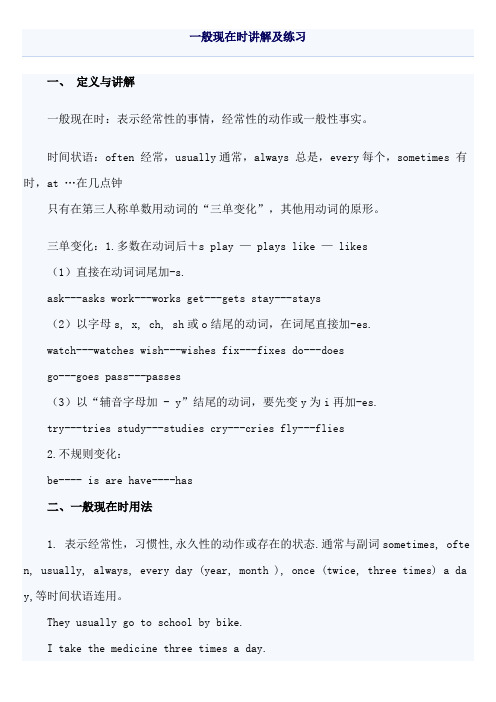
一、定义与讲解一般现在时:表示经常性的事情,经常性的动作或一般性事实。
时间状语:often 经常,usually通常,always 总是,every每个,sometimes 有时,at …在几点钟只有在第三人称单数用动词的“三单变化”,其他用动词的原形。
三单变化:1.多数在动词后+s play — plays like — likes(1)直接在动词词尾加-s.ask---asks work---works get---gets stay---stays(2)以字母s, x, ch, sh或o结尾的动词,在词尾直接加-es.watch---watches wish---wishes fix---fixes do---doesgo---goes pass---passes(3)以“辅音字母加 - y”结尾的动词,要先变y为i再加-es.try---tries study---studies cry---cries fly---flies2.不规则变化:be---- is are have----has二、一般现在时用法1. 表示经常性,习惯性,永久性的动作或存在的状态.通常与副词sometimes, ofte n, usually, always, every day (year, month ), once (twice, three times) a da y,等时间状语连用。
They usually go to school by bike.I take the medicine three times a day.She helps her mother once a week.Mary’s father is a policeman.There are 50 students in my class.2. 表示客观真理,科学原理,自然现象,等客观事实或格言,谚语等。
The sun rises in the east and sets in the west every day.The man who has never been to the Great Wall is not a real man.Tomorrow is Tuesday.三、一般现在时的句子转换:(1)当句子中有be动词或情态动词时,则把be动词或情态动词(can,could等等)提到主语的前面变成疑问句;在be动词或情态动词后面加not变成否定句.例:①陈述句:She is a student.疑问句→ Is she a student?否定句→ She is not a student.②陈述句:I can swim.疑问句→ Can you swim否定句→ I can not swim.(2)当句子中即没有be动词,也没有情态动词时,则在主语前加助动词do (you,以及复数), does(单数she,he,it)变成问句;在主语后谓语动词前加助动词don’t(I, you,以及复数), doesn’t(单数she,he,it)变成否定句,助动词后的动词要变成动词原形。
小学生一般现在时讲解及练习题
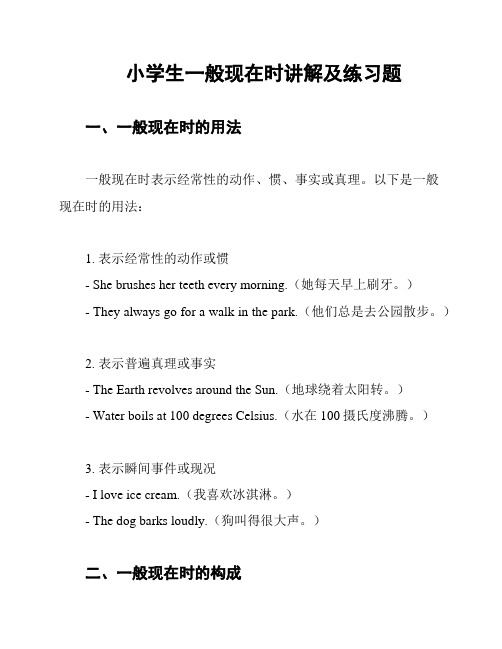
小学生一般现在时讲解及练习题一、一般现在时的用法一般现在时表示经常性的动作、惯、事实或真理。
以下是一般现在时的用法:1. 表示经常性的动作或惯- She brushes her teeth every morning.(她每天早上刷牙。
)- They always go for a walk in the park.(他们总是去公园散步。
)2. 表示普遍真理或事实- The Earth revolves around the Sun.(地球绕着太阳转。
)- Water boils at 100 degrees Celsius.(水在100摄氏度沸腾。
)3. 表示瞬间事件或现况- I love ice cream.(我喜欢冰淇淋。
)- The dog barks loudly.(狗叫得很大声。
)二、一般现在时的构成在一般现在时中,动词的变化相对简单。
1. 对于第三人称单数(He/She/It),动词要加-s或-es。
- He walks to school every day.(他每天走路去学校。
)- She eats an apple.(她吃一个苹果。
)- It runs fast.(它跑得很快。
)2. 对于其他人称(I/You/We/They),动词不变。
- I play soccer on weekends.(我周末踢足球。
)- You read books every night.(你每晚读书。
)- We go swimming in summer.(我们夏天去游泳。
)- They watch movies together.(他们一起看电影。
)三、练题请根据句意填入正确的动词形式。
1. My mother __________ (cook) dinner for us every evening.2. Tom and Lisa __________ (play) tennis on Saturdays.3. The sun __________ (rise) in the east.4. We __________ (study) English at school.5. Dogs __________ (bark) when they see strangers.1. cooks2. play3. rises4. study5. bark希望以上讲解和练习题对你有帮助!。
一般现在时讲解及练习题
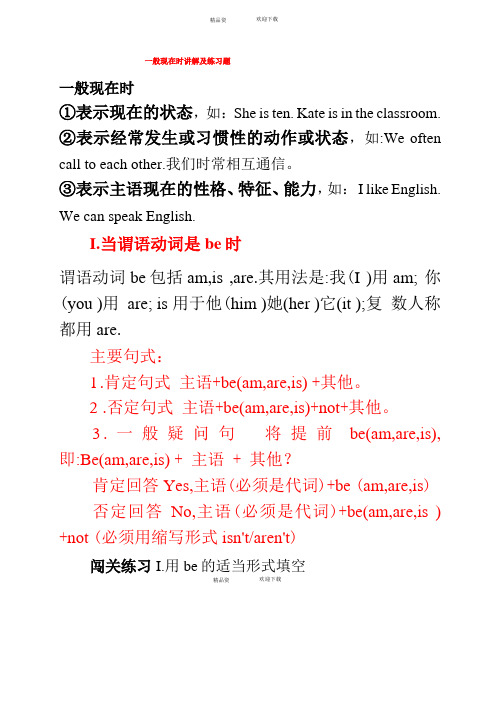
欢迎下载一般现在时讲解及练习题一般现在时①表示现在的状态,如:She is ten. Kate is in the classroom. ②表示经常发生或习惯性的动作或状态,如:We often call to each other.我们时常相互通信。
③表示主语现在的性格、特征、能力,如: I like English. We can speak English.I.当谓语动词是be 时谓语动词be 包括am,is ,are.其用法是:我(I )用am; 你(you )用 are; is 用于他(him )她(her )它(it );复 数人称都用are.主要句式:1 .肯定句式 主语+be(am,are,is) +其他。
2 .否定句式 主语+be(am,are,is)+not +其他。
3 .一般疑问句 将提前be(am,are,is), 即:Be(am,are,is) + 主语 + 其他?肯定回答Yes,主语(必须是代词)+be (am,are,is )否定回答No,主语(必须是代词)+be(am,are,is )+not (必须用缩写形式isn't/aren't )闯关练习I.用be 的适当形式填空欢迎下载 精品资 精品资1.---How you? ---I fine.2.I David,and my family name Green.3.---What color your clock? ---It white.4.---What this in English?---It an apple.5.Toy my brother.David mybrother,too.They my brothers.6.Look!These apple trees.7.We good students and you good teacher.8.My sister and my brother students.9.Five and three eight.10.your card number 5578?11.Where your pencils?12.These sweaters fifty dollars.13.How much his jacket?14.My brother,s birthday December 11th.15.When Kate,s birthday?II.将下面的句子变成一般疑问句并作出回答1.That is my football.2.Those are his books.3.Jim and Tom are good friends.4.My birthday is November 1st.欢迎下载精品资5.His son is twelve years old.111.将下面的句子变成否定句1.His card is on the table.2.There is some water in the bottle.3.Bob and Tony are our friends.4.There are thirty-five students in the classroom.5.The girl is his sister.II.当谓语动词是实义动词时1.当主语是第一人称(I \ we );第二人称(you)及复数时主要句式:(1)肯定句主语+实义动词+其他(2)否定句主语+don’t+实义动词+其他(3)一般疑问句Do+主语+实义动词+其他肯定回答:Yes,主语(必须是人称代词)+do. 否定回答:No,主语(必须是人称代词)+don’t.2.当主语是第三人称单数he, she, it及单数的名词时,主要句式:(1)肯定句:主语+实义动词的第三人称单数形式+其他一(2)否定句:主语+doesn’t+实义动词的原形+ 其他一欢迎下载精品资(3)一般疑问句Does +主语+实义动词的原形+其他肯定回答:Yes,主语(必须是人称代词)+does否定回答:No,主语(必须是人称代词)+doesn’t 动词第三人称单数形式变化规则:特殊变化have----has一、一般情况加s,例如:looks, likes, wants, plays,二、以ch, sh, s, x或o结尾的词,加-es,例如:teaches, washes, guesses, goes, does三、辅音字母+y结尾,变y为i力口-es,例如:carr yf carries, stud y f studies闯关练习I/将下面的句子变成一般疑问句并作出回答1.1h ave a baseball.2.Meria likes apples very much.3.He plays Ping-pang every day.4.We watch TV in the evening.5.Mr Wang often buys lots of things.6. Jane and Mary go to school at 7:30.II.将下面的句子变成否定句1.1n eed a bag for sport.2.He wants to go to a movie.3.She often goes to see Beijing Opera.欢迎下载精品资4.The girl has an egg for breakfast.5.We play basketball every day.6.My teacher knows my name.7.It sounds very interesting.IV.用所给词的适当形式填至1. her sister(have) a tennis racket?2.your friend(like) basketball?3.We(play) football every day.4.It(sound) very well.5.Jim(want) an orange.7.My mother(watch)TV in the evening.8. you(like) English?9. Mike and Li Lei(not like) eggs.10.What color your sister(like)?11. She(know) a little English.改写句子1.Do you often play football after school?(肯定回答)2.I have many books.(改为否定句)3.Gao Shan's sister likes playing tab改为否定句)欢迎下载4. She lives in a small town near New York. 疑问句)5. I watch TV every day.(改为一般疑问句)6. David has a goal.(改为一般疑问句)7. We have four lessons.(否定句)8. Nancy doesn't run f 肯定句)9. My dog runs fast.否定句:10. Mike has two letters for him.一般疑问句:I usually play football on Friday afternoon.一般疑问句: 精品资 (改为一般。
一般现在时的讲解以及练习题
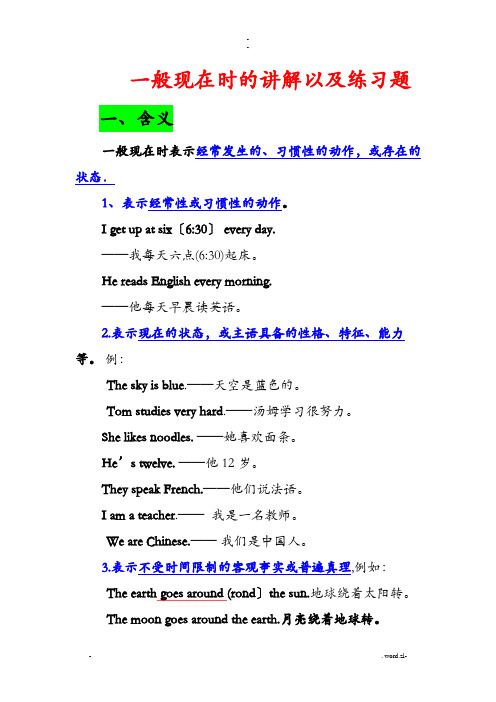
一般现在时的讲解以及练习题一、含义一般现在时表示经常发生的、习惯性的动作,或存在的状态.1、表示经常性或习惯性的动作。
I get up at six〔6:30〕 every day.——我每天六点(6:30)起床。
He reads English every morning.——他每天早晨读英语。
2.表示现在的状态,或主语具备的性格、特征、能力等。
例:The sky is blue.——天空是蓝色的。
Tom studies very hard.——汤姆学习很努力。
She likes noodles.——她喜欢面条。
He’s twelve. ——他12岁。
They speak French.——他们说法语。
I am a teacher.——我是一名教师。
We are Chinese.——我们是中国人。
There are seven days in a week. 一周有七天.Two and four is six.二加四等于六。
start, e,go, leave, arrive, stay , return、等动词。
例如:My train leaves at 6:30 this morning.我乘坐的火车在今天早晨6:30离开。
How long do you stay here?你在这住多久?begin[bɪˈgɪn]v 开场,再来一次start [stɑ:rt]n& vi开场;动身;起点e[kʌm]v 来leave[li:v]n辞别、假期, v离开,出发arrive[əˈraɪv]v到达stay[steɪ]n& vi 停留,住下return[rɪˈtɜ:n]v.返回;送还;n.归来,返乡;二、一般现在时常用时间状语★3、次数★once[wʌns]adv.一次;一倍;曾经;conj.一旦…就…;n.一次,一回twice[twaɪs] adv.两次;两倍;两遍★ 4、频率副词★一般现在时常和never 、seldom、 rarely、barely、hardly、always, often, usually, sometimes等表示时间的状语连用1、never [ˈnevə(r)] adv.决不;从不,从来没有;【否认意义最强】2、seldom[ˈseldəm]adv.很少,偶尔,不经常【表示次数很少,=not offten,程度次于never】3、rarely[英][ˈreəli] adv.很少地,难得地,少见地 ,珍奇地【表示数量很少】barely[ˈbeəli]adv.仅仅,勉强,几乎不,几乎没有;赤裸裸地,公开地【强调勉强够数;】4、hardly[英][ˈhɑ:dli]简直不,几乎不,几乎没有【=almost not,强调困难.程度次于seldom】scarcely[英][ˈskeəsli][美][ˈskersli]adv.几乎不,简直不【scarely=hardly ,用在be/助动词后,强调数量和程度的缺乏】5、always [ˈɔ:lweɪz] adv.总是,永远,常常;【程度最强】6、usually adv.通常,经常,平常;一般;【程度稍次于always】7、often [ˈɔ:fn]屡次,时常,【程度次于usualy】8、sometimes[ˈsʌmtaɪmz]有时,【程度次于often】三、一般现在时的用法※★〔一〕、肯定句★※★1、句中有系动词be的一般现在时构成★主语+be+其它The girl is my friend. 这个女姟是我的朋友。
一般现在时态讲义及专项练习
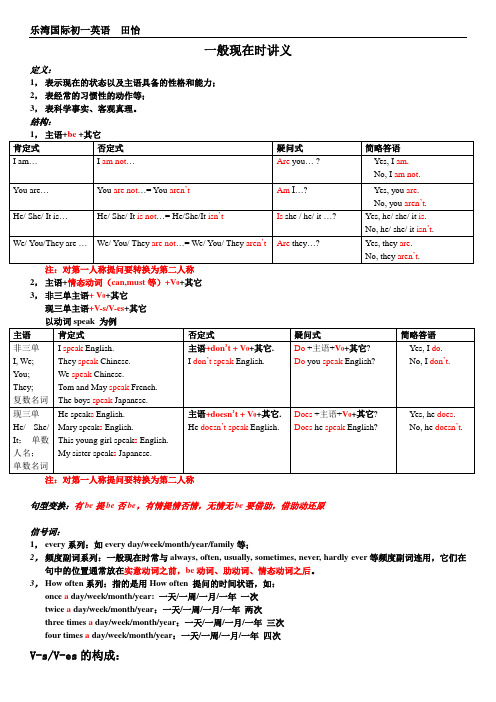
一般现在时讲义定义:1, 表示现在的状态以及主语具备的性格和能力; 2, 表经常的习惯性的动作等; 3, 表科学事实、客观真理。
结构:注:对第一人称提问要转换为第二人称 2, 主语+情态动词(can,must 等)+V 0+其它 3,非三单主语+ V 0+其它现三单主语+V-s/V-es +其它 以动词speak 为例句型变换:有be 提be 否be ,有情提情否情,无情无be 要借助,借助动还原信号词:1, every 系列:如every day/week/month/year/family 等;2, 频度副词系列:一般现在时常与always, often, usually, sometimes, never, hardly ever 等频度副词连用,它们在句中的位置通常放在实意动词之前,be 动词、助动词、情态动词之后。
3, How often 系列:指的是用How often 提问的时间状语,如:once a day/week/month/year: 一天/一周/一月/一年 一次 twice a day/week/month/year :一天/一周/一月/一年 两次three times a day/week/month/year :一天/一周/一月/一年 三次 four times a day/week/month/year :一天/一周/一月/一年 四次V-s/V-es 的构成:当主语是第三人称单数时,动词形式需下列几种变化:1 一般动词在词尾加s: helps, makes, leaves, knows, plays2 以-s, -x, -ch, -sh, -o字母结尾的动词加es: teaches, goes, washes. fixes3 以辅音字母加y结尾的动词,变y为i, 加es: flies, studies, cries4 不规则变化:do—does, go—goes, have--has一般现在时专项练习一、写出下列单词第三人称单数形式:catch_______ guess______ thank______take_______ leave_______ love______watch_______ carry_______ see_______ answer_______ come_______ sleep______go_______ eat________ do______be ________ have ________ fly _______二、选择题:( )1.How many balloons _______ you have?A. areB. isC. doesD. do( )2. Where_____ Jim come from?A. isB. areC. doD. does( )3. ____your father______ to work on a train?A. Do; goB. Does; goesC. Does; goD. Do; goes( )4. ____ Jim____ any colored pencils? No, he ____. A. Is, has, has B. Do, have, hasC. Does, have, doesn'tD. Is, have, isn’t( )5. When________ your brother often do______ homework?A. do, /B. does, hisC. does, /D. do, his ( )6. I think Tom_______ a bike.A. there isB. haveC. doesD. has( )7. We_____ games or_____ kites every Sunday.A. playing, flyingB. play, flyC. do, makeD. take, mend( )8. I often _______ TV in the evening.A. watchB. seeC. watchesD. looks at ( )9. He usually____ his office at six in the afternoon. A. leave B. leaves C. to leave D. leaving ( )10. Li Lei_______ to eat an apple. Please give one to______.A. want, himB. wants, heC. want, hisD. wants, him ( )11. The twins _____ from Japan.A. isB. doC. comeD. comes( )12. ______ your father______ to work on a train?A. Do; goB. Does; goesC. Does; goD. Do; goes( )13.My friend ______not at home.A. isB. wereC. wasD. are( )14. Where ________ Mr. Smith live?A. isB. areC. doD. does( )15.Where ________Mr. Smith from?A. isB. comeC. doesD. are三、将下列句子变成否定句和一般疑问句:1. Jim usually has his dinner at 7:10.____________________________________________________________________________2. Lily and Lucy study English in the same class.____________________________________________________________________________3. Your football and basketball are under the bed.____________________________________________________________________________4. I sometimes go to the library at the weekend.____________________________________________________________________________5. We like our English teacher in WIS school.____________________________________________________________________________6. There are some books and a pen on the desk.____________________________________________________________________________7. She has a beautiful hat.____________________________________________________________________________8. I think Tom has a bike.____________________________________________________________________________9. We play games every Sundays.____________________________________________________________________________10. He always go to school at 7 o’clock in the morning.____________________________________________________________________________四、用动词的适当形式填空.1. The shop________(open) at 8 every morning.2. ________my sister __________(do) her homework every day?乐湾国际初一英语田怡3. The American _______( study) Chinese in our school.4. ________ the little girl _______(dress) herself?5. Where _______ Mr Smith________(live)?6. ________ they often_______(listen) to the radio?7. The children ______(work) very hard in the evening.8. She often_______(wash) her clothes.9. What ______ you usually ______(do) in the evening?10. Mrs. Smith always ________(stay) at home.11._________he __________(go) to school on Saturdays?12. He always ___________(go)to school at 7 in the morning.13.There________(be) a lot of cars on the street.14.We _________(stay) at my uncle’s for the weekend.15.She _________(have) four balloons.五、用下列词的正确形式填空。
一般现在时讲解与练习

一般现在时Present Tense一、概念:表示通常性、规律性、习惯性的状态或者动作(有时间规律发生的事件)的一种时间状态。
拆开来讲就是:时间:指动作发生在“现在”的时间段内。
那么,多长的时间才叫“现在”呢?一天?状态:一般现在时最容易迷惑的一个问题,就是拿不准什么叫“经常发生的动作或存在的状态”?这个问题要分三层来讲:1.“经常发生的动作”,比如每天起床、吃饭、上学,一个星期去几次超市或新华书店等。
这些事件中,有的是有规律的,有的是偶尔做几次。
这些都算经常发生的事件。
我们要告诉人们的,是这个动作经常发生,是一般的情况而不是具体的某一次。
2.事物存在的状态。
3.有些动作或状态是永恒的,比如长江向东流、地球绕着太阳转,比如谚语中举的事例、文学作品中描绘的事例,像“好马不吃回头草”等等二、基本用法:1.表示经常性或习惯性发生的动作。
如:I always get up at 7 o’clock in the morning.我总是在早上7点起床。
We often read books at school.我们在学校经常看书。
They usually have dinner at 6:00 in the evening.他们通常在晚上6点吃晚餐。
2.表示现在的状态或特征。
如:She loves English very much.她非常爱英语。
We are always at home on weekends.周末我们总留在家。
Tom is an exellent player.汤姆是一位优秀的运动员。
3.表示客观的现实。
如:The sun rises in the east.太阳从东方升起。
Summer comes after spring.夏天在春天的后面4.用在按计划、规定或安排发生的事情。
如:The plane leaves at 9:30.飞机9点30分起飞。
Tomorrow is Sunday.明天是星期天。
小学六年级上册英语时态精讲练习

小学六年级上册英语时态精讲练习第一部分:一般现在时一般现在时表示现在的状态或惯性动作。
例子:1. I am a student. (我是一个学生。
)am a student. (我是一个学生。
)2. We play football every Sunday. (我们每个星期天都踢足球。
)play football every Sunday. (我们每个星期天都踢足球。
)练题:1. She often __(do)__ her homework at night. (她经常在晚上做作业。
)2. They __(be)__ my good friends. (他们是我好朋友。
)第二部分:现在进行时现在进行时表示现在正在进行的动作或状态。
例子:1. She is reading a book. (她正在看书。
)is reading a book. (她正在看书。
)2. I am doing my homework. (我正在做作业。
)am doing my homework. (我正在做作业。
)练题:1. They __ (play)__ football now.(他们现在正在踢足球。
)2. She __ (read)__ a book at the moment.(她现在正在看书。
)第三部分:一般过去时一般过去时表示过去发生的动作或状态。
例子:1. I was in Beijing last year. (我去年在北京。
)was in Beijing last year. (我去年在北京。
)2. We went to the park yesterday. (我们昨天去了公园。
)went to the park yesterday. (我们昨天去了公园。
)练题:1. He __ (be)__ at home last night.(他昨晚在家。
)2. They __ (go)__ to the cinema last weekend.(他们上周末去了电影院。
七年级英语语法:一般现在时及练习
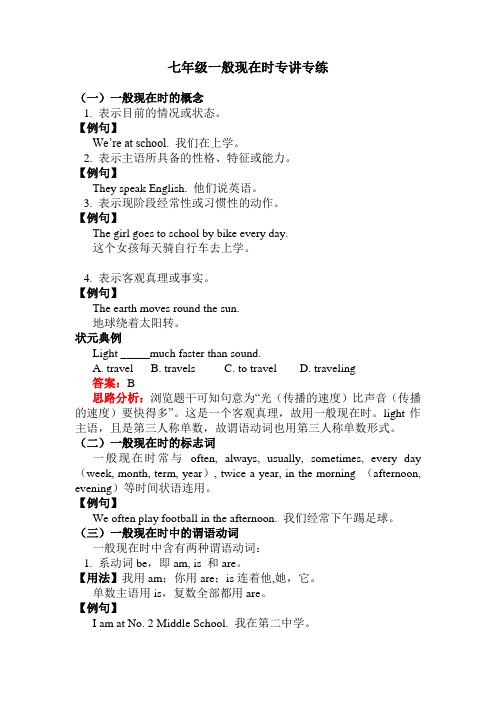
七年级一般现在时专讲专练(一)一般现在时的概念1. 表示目前的情况或状态。
【例句】We’re at school. 我们在上学。
2. 表示主语所具备的性格、特征或能力。
【例句】They speak English. 他们说英语。
3. 表示现阶段经常性或习惯性的动作。
【例句】The girl goes to school by bike every day.这个女孩每天骑自行车去上学。
4. 表示客观真理或事实。
【例句】The earth moves round the sun.地球绕着太阳转。
状元典例Light _____much faster than sound.A. travelB. travelsC. to travelD. traveling答案:B思路分析:浏览题干可知句意为“光(传播的速度)比声音(传播的速度)要快得多”。
这是一个客观真理,故用一般现在时。
light作主语,且是第三人称单数,故谓语动词也用第三人称单数形式。
(二)一般现在时的标志词一般现在时常与often, always, usually, sometimes, every day (week, month, term, year), twice a year, in the morning (afternoon, evening)等时间状语连用。
【例句】We often play football in the afternoon. 我们经常下午踢足球。
(三)一般现在时中的谓语动词一般现在时中含有两种谓语动词:1. 系动词be,即am, is 和are。
【用法】我用am;你用are;is连着他,她,它。
单数主语用is,复数全部都用are。
【例句】I am at No. 2 Middle School. 我在第二中学。
You are a doctor. 你是一名医生。
It is my cat. 它是我的小猫。
状元典例The boys _____ students.A. amB. isC. areD. be答案:C思路分析:根据主语the boys是复数可知谓语动词应用复数形式。
小学英一般现在时讲解和练习

小学英语一般现在时一. 意义:表示经常发生的事情,动作或存在的状态二. 构成及变化1.be动词的变化。
肯定句:主语+be(am,is,are)+其它。
如:I am a boy.我是一个男孩。
否定句:主语+ be + not +其它。
如:He is not a worker.他不是工人。
一般疑问句:Be +主语+其它。
如:-Are you a student? -Yes. I am. / No, I'm not.特殊疑问句:疑问词+一般疑问句。
如:Where is my bike?2. 行为动词的变化。
l、当主语为第一,二人称及复数时,助动词为do肯定句:主语+动词原形(+其它)。
如:We often play basketball after school.否定句:主语+ don't+动词原形(+其它)。
如:we don’t play basketball after school.一般疑问句:Do +主语+动词原形+其它?如: Do you often play basketball after school l? Yes, we do. / No, we don't.特殊疑问句:疑问词+以do开头的一般疑问句?如: What do you often do after school ?2、当主语为第三人称单数时 ,助动词为does肯定句:主语+动词三单式(+其它)。
如: He swims well.否定句:主语+ doesn’t+动词原形(+其它)。
如:He doesn’t swim well..一般疑问句:Does +主语+动词原形+其它。
如:Does he swim well ?Yes, he does. / No, he doesn't.特殊疑问句:疑问词+以does开头的一般疑问句?如: How does your father go to work?三.第三人称单数的动词变化规则(只有在第三人称为主语的肯定句中,动词才用三单式)(1)多数动词直接加s: runs gets likes collets takes plays climbs…….(2)结尾是s, x, sh, ch, o,前为辅音字母,结尾加es : watches teaches goes does washes crosses mixes brushes(3)动词末尾y前为辅音:将y改为i加es: study→studies fly→fliescarry→carriescry→cries但在y前如果为元音则直接加s: buys says四.时间标志:always , usually , often , sometimes ,every…一般现在时练习题(1)I.用下列单词的适当形式填空1.We often___________(play) in the playground.2.He _________(get) up at s ix o’clock.3.__________you _________(brush) your teeth every morning?4.What________________(do) he usually________________(do) after school?5.Danny ________________(study) English, Chinese, maths, science and Art at school.6.Mike sometimes __________(go) to the park with his sister.7.At eight at night, she __________(watch) TV with his parents.8.________ Mike________(read) English every day?9.How many lessons_________your classmates________(have) on Monday?10.What time_________his mother_________(do) the housework?II.改句子1.Do you often play football after school? (改为肯定句)2.I have many books.(改为否定句)3.Gao Shan’s sister likes playing table tennis (改为否定句)4.She lives in a small town near New York.(改为一般疑问句)5.I watch TV every day.(改为一般疑问句)6.We have four lessons.(改为否定句)7.Nancy doesn’t run fast (改为肯定句)8.My dog runs fast.否定句:一般疑问句:9.Mike has two letters for him.一般疑问句:否定句:10.I usually play football on Friday afternoon.否定句:一般疑问句:划线提问11.Su Yang usually washes some clothes on Saturday.否定句:一般疑问句:划线提问:12.Mingming usually waters the flowers every day.否定句:一般疑问句:13.Tom does his homework at home.否定句:一般疑问句:一般现在时练习题(2)一、用所给动词的真确形式填空1.I like ____________ (swim).2.He _________(read) English every day.3.We _________(go)to school at seven in the morning.4.Mike________(go)to school at seven in the morning.5.My mother________(like) ______(go) shopping.6.I can ________(draw) many beautiful pictures.7.She_________(make) a model plane.8.Do you ________(like)_________(run)?9.Does he_________(like)_________(jump) ?10.Does Nancy_________(grow)flowers on Saturday ?11.The teachers________(like)___________(dance).12.The teacher________(like)____________(dance).13.The students___________(speak) English in class.14.The student_________(speak) Chinese after class.15. Let’s____________and play football . ( go )16. He_____________ like swimming . ( not )17. I’m sorry ____________that . ( hear )18. Wang Bing is____________ ( write ) an E-mail to his friend .19. He has_____________a headache . ( get )20. _________you study English at school ? Yes , I___________. ( do )21. __________your sister study English at school ? No , she__________ . ( do )22. I’m _________ better . ( feel )23. Why__________Tom absent today ? ( be )二、用所给的人称改写句子1.I take photos on Sunday. ( Mike)2.We grow beautiful flowers. (she)3.They like collecting stamps. (Ben)4.I listen to music carefully. (my aunt)5.You like making a model ship. (Helen)6.We clean the classroom every day. (he)7.They look after the pandas. (Mr Wang)8.I draw a tree and some flowers. (Nancy)9.We go to bed at eight. ( my sister)10.I read newspapers in the evening. (Mr Green)一般现在时练习一、写出下列动词的第三人称单数talk______forget______hope______stop______perform______play______say______buy______worry______fly______study_______like_______make______take______love_______recite_______become_______come_______drive_______shine_______leave_____wake_______ride_______write_______hike______give______see______swim______stop______shop_______plan______get_______s it_______let_______cut_______run_______forget_______begin_______wash_____watch_______finish______teach_____fish_______reach_______go_______do_____二、用括号内动词的适当形式填空。
一般现在时讲解
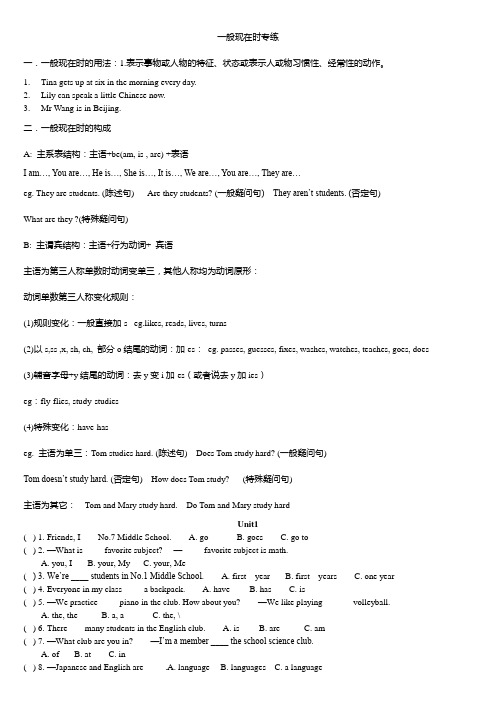
一般现在时专练一.一般现在时的用法:1.表示事物或人物的特征、状态或表示人或物习惯性、经常性的动作。
1.Tina gets up at six in the morning every day.2.Lily can speak a little Chinese now.3.Mr Wang is in Beijing.二.一般现在时的构成A: 主系表结构:主语+be(am, is , are) +表语I am…, Y ou are…, He is…, She is…, It is…, We are…, Y ou are…, They are…eg. They are students. (陈述句) Are they students? (一般疑问句) They aren’t students. (否定句)What are they ?(特殊疑问句)B: 主谓宾结构:主语+行为动词+ 宾语主语为第三人称单数时动词变单三,其他人称均为动词原形:动词单数第三人称变化规则:(1)规则变化:一般直接加-s eg.likes, reads, lives, turns(2)以s,ss ,x, sh, ch, 部分o结尾的动词:加-es:eg. passes, guesses, fixes, washes, watches, teaches, goes, does(3)辅音字母+y结尾的动词:去y变i加-es(或者说去y加ies)eg:fly-flies, study-studies(4)特殊变化:have-haseg. 主语为单三:Tom studies hard. (陈述句) Does Tom study hard? (一般疑问句)Tom doesn’t study hard. (否定句) How does Tom study?(特殊疑问句)主语为其它:Tom and Mary study hard. Do Tom and Mary study hardUnit1( ) 1. Friends, I ___ No.7 Middle School. A. go B. goes C. go to( ) 2. —What is ____ favorite subject? — ____ favorite subject is math.A. you, IB. your, MyC. your, Me( ) 3. We’re ____ students in No.1 Middle School. A. first---year B. first---years C. one year( ) 4. Everyone in my class ____ a backpack. A. have B. has C. is( ) 5. —We practice ____ piano in the club. How about you? —We like playing ______ volleyball.A. the, theB. a, aC. the, \( ) 6. There ___ many students in the English club. A. is B. are C. am( ) 7. —What club are you in? —I’m a member ____ the school science club.A. ofB. atC. in( ) 8. —Japanese and English are ____ .A. language B. languages C. a language( ) 9. —Hello, nice to meet you. —Hello, _______.A. I like ChineseB.Nice to meet you, tooC.I’m Zhang Wei( ) 10. Liu Chang ___ robots and computers. A. like B. is C. likes( ) 15. Which stress of the following words is different ?A. ChineseB. studyC. deliciousLiu Chang likes robots and computers. He is in the science club. Liu Chang likes languages. She 9 English in the English club. How about you? What 10 you like? Are you in a club?( ) 1 A. meet B. to meet C. meeting( )2.A. first-year B. am C. are( )3 A. is B. am C .are( )4 A. like B. likes C. to like( )5 A. at B. of C. in( )6 A My B.I C. Me( )7 A. language B. languages C. Languages( )8 A. at B. of C .in( )9 A. practice B .practices C .practicing( )10A. are B. can C. do三.阅读理解:(A)Our teacher has many pictures. Every morning she shows those pictures to us. She wants us to learn something from her pictures. In one of her pictures, we see a boy at work. He is cleaning the room. In another picture, a girl is writing. She is doing her homework. In other pictures, we see others doing different things. One is thinking, another is making cakes, still another is running. We look at our teacher and her pictures. We talk in English and our teacher listens to us. We learn English from our teacher and from the pictures. Our teacher likes us . We like her and her class, too.根据短文内容选择最佳答案( ) 1. Our teacher teaches us ___________ . A. Art B. Chinese C. English( ) 2. She shows us pictures because she wants us to learn something about _________ .A. cleaningB. making cakesC. English( ) 3. In one of the pictures, a boy is _________ . A. cleaning the room B. running C. English( ) 4. Our teacher likes us because __________ . A. we listen to her B. we can talk in English C. we can run( ) 5. In other pictures, we see _______________ .A. one is thinking , another is making cakes , still another is runningB. one girl is writing( ) 1. What kind of food does Susan like best ?A. Hamburgers. B. Dumplings. C. Rice.( ) 2. ___________ is Mike’s favorite sport. A. Running B. Push-ups C. Sit-ups( ) 3. Who likes egg rolls?A. Amy. B. Sam. C. Mike.( ) 4. Sam’s favorite subject is ___________ .A. Chinese B. English C. Math( ) 5. Whose life is much healthier? A. Susan. B. Mike. C. Amy.( C )Jim is in a drawing class. The teacher is teaching them how to draw mountains. Jim likes to draw, but he isn’t good at drawing mountains. He looks at Dav id’s drawing .David’s mountain is very high. He looks at WeiHua’s drawing. Her mountain is higher than David’s. Jim then looks at Lin Tao’s mountain. His is the highest of all. Jim thinks he doesn’t like high mountains, but he doesn’t know what to draw. He wants to look at some more drawings. Jim looks at Lucy’s mountain. Her mountain is small. Lily says, “Look at mine , Jim.” Lily’s mountain is smaller than Lucy’s. Jim wants to look at one moremountain. He looks at Liz’s. Hers is the smallest of the three. Jim looks at the teacher’s mountain on the blackboard again. He starts to draw. At the end of the class the teacher takes out three drawings. He says, “David’s drawing is good. Lily’s is be tter than David’s, but Jim’s is the best of all.”根据短文内容判断正(A)误(B)( ) 1. Jim doesn’t like drawing mountains at all.( ) 2. Lin Tao’s mountain is higher than David’s and Wei Hua’s.( ) 3. Lily’s mountain is smaller than Lucy’s and Liz’s.( ) 4. Jim’s mountain is the best of all.( ) 5. From the passage, we know that if we keep trying, we can do everything well.四.任务型阅读My name is Liu Chang. I’m glad to ___1___ everyone . I ___2___ from No. 8 Middle School. I’m a first-year student. I’m in ___3___ One. My favorite subject is science. I ___4___ like robots and ___5___ . I’m a member of the science club.(B)Hello, everyone. Glad to meet you. I’m Wang Dandan. I’m a student at No. 8 Middle school, too. I like new languages, such as English. I’m in an English club. I practice English every day.任务一:用方框中所给词的适当形式填空。
一般现在时讲解及练习(含答案)

一般现在时讲解及练习(含答案)一、单项选择一般现在时1.If he ________ exercise, he______ healthy.A.not; will B.isn’t; won’t beC.doesn’t; will be D.doesn’t do; won’t be【答案】D【解析】【详解】考查if条件句中的时态。
句意:如果他不做运动,他就不会健康。
If条件句,如果主句用一般将来时态,则从句用一般现在时态,且句子主语是he,单数第三人称,故选D。
2.Whene ver you ______ a present, you’d better think about it from the receiver’s preference. A.bought B.buy C.will buy D.have bought【答案】B【解析】试题分析:句意:每当你买礼物的时候,你最好从接收方的偏好想一想。
whenever引导的让步状语从句,采用一般现在时表将来的用法。
故选B。
考点:考查动词的时态。
3.The Dragon Boat Festival ________ the beginning of the hottest season of the year.A.is marking B.marks C.will mark D.marked【答案】B【解析】试题分析:考查时态。
一般现在时表示经常性习惯性的行为。
本句中使用一般现在时端午节标志着一年中最热的季节的开始。
故B正确。
考点:考查时态4.That’s why I help brighten people’s days. If you ________, who’s to say that anothe r person will?A.didn’t B.don’tC.weren’t D.haven’t【答案】B【解析】【详解】考查条件状语从句中动词的时态。
一般现在时讲解及练习
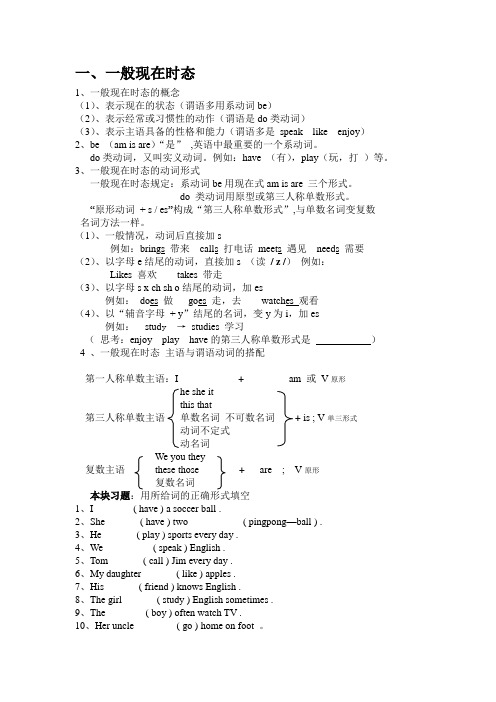
一、一般现在时态1、一般现在时态的概念(1)、表示现在的状态(谓语多用系动词be)(2)、表示经常或习惯性的动作(谓语是do类动词)(3)、表示主语具备的性格和能力(谓语多是speak like enjoy)2、be (am is are)“是”,英语中最重要的一个系动词。
do类动词,又叫实义动词。
例如:have (有),play(玩,打)等。
3、一般现在时态的动词形式一般现在时态规定:系动词be用现在式am is are 三个形式。
do 类动词用原型或第三人称单数形式。
“原形动词+ s / es”构成“第三人称单数形式”,与单数名词变复数名词方法一样。
(1)、一般情况,动词后直接加s例如:brings 带来calls 打电话meets 遇见needs 需要(2)、以字母e结尾的动词,直接加s (读/ z /)例如:Likes 喜欢takes 带走(3)、以字母s x ch sh o结尾的动词,加es例如:does 做goes 走,去watches 观看(4)、以“辅音字母+ y”结尾的名词,变y为i,加es例如:stud y →studies 学习(思考:enjoy play have的第三人称单数形式是)4 、一般现在时态主语与谓语动词的搭配第一人称单数主语:I +am 或V原形he she itthis that第三人称单数主语单数名词不可数名词+ is ; V单三形式动词不定式动名词We you they复数主语these those + are ; V原形复数名词本块习题:用所给词的正确形式填空1、I _______ ( have ) a soccer ball .2、She ______ ( have ) two __________ ( pingpong—ball ) .3、He ______ ( play ) sports every day .4、We ______ ( speak ) English .5、Tom ______ ( call ) Jim every day .6、My daughter ______ ( like ) apples .7、His ______ ( friend ) knows English .8、The girl ______ ( study ) English sometimes .9、The _______ ( boy ) often watch TV .10、Her uncle ______ ( go ) home on foot 。
中考英语专题讲练: 一般现在时(含解析)

一般现在时知识精讲一般现在时一、一般现在时表示通常性、规律性、习惯性、真理性的状态或者动作有时间规律发生的事件的一种时间状态。
二、句子结构主语(第一、二人称、第三人称复数)+do (动词原形)主语(第三人称单数)+does (动词三单形式)主语+am/is/are三、基本用法用法示例表示经常性或习惯性的动作We get up at six every morning.我们每天早上六点钟起床。
表示现在的状态、能力、性格Mr. Wang writes good English but he doesn’t speak well.王先生的英文写得很好但他说不好。
表示格言或警句Pride goes before a fall.四、时间状语1.2.every/once + 名词:every day/ week/ year, once a week/month …3.表示时间的短语:twice a day, on weekends, on Mondays…五、一般现在时三单数动词的变化规律六、相关句式三点剖析一、考点:时态是英语学习中的核心内容之一,是英语学习的基础。
自然,时态考查是各种英语考试尤其是中考考时的座上宾。
动作发生的时间决定时态,时态决定动词的形式,而考卷中的时态题通常没有给出明确的时间标志词,考试需领悟所提供的语境来做出判断。
只有推断出动作发生的正确的时间,才可能正确答题,这就要求考生在熟练掌握时态结构、用法并牢记常用的时间状语的基础上,要充分利用上下文中隐含的信息来捕捉时间,找准答题的突破口。
二、重难点:一般现在时在考试中的重难点是:句子结构、基本用法、标志时间状语、动词的三单变化规律及相关句式的变化。
三、补充点:1.表示按计划或安排好的,或将要发生的动作,可用一般现在时表将来。
但只限于start, begin, leave, go, come, arrive, return, take place 等。
- 1、下载文档前请自行甄别文档内容的完整性,平台不提供额外的编辑、内容补充、找答案等附加服务。
- 2、"仅部分预览"的文档,不可在线预览部分如存在完整性等问题,可反馈申请退款(可完整预览的文档不适用该条件!)。
- 3、如文档侵犯您的权益,请联系客服反馈,我们会尽快为您处理(人工客服工作时间:9:00-18:30)。
练习:用所给单词的正确形式填空 am are 1,I______(be)late for class . 2. You , he and I____(be) Is classmates . 3, _______ your friend in China ? Yes , he are is _______ ( be) . 4, What _______ those over there ? They are are _______ watches . ( be ) 5, Tom and Kate ______(be) is in the same school . 6, His sister _______( be) an English like help teacher . 7, I _______( like) fruit . 8, We _______(help) want them . 9, They __________( want ) to play football . play 10, My classmates ________( play ) ping-pong after class . likes 11, He ________( like) potatoes . 12, She _______( ask) me asks plays to help her . 13, Lisa ________ ( play) volleyball with us want at school . 14,Mary and Mike _________( want ) milk . watches 15, Your brother ________( watch ) them on TV every day . goes 16, Who________(go) to school in the morning .
一般现在时: 一,表示现在或经常存在的状态,谓语用be动词。 其结构是:主语+am/is/are …. 。 I am 11 years old . 例如:1,我是十一岁。________________________ My schoolbag is on the desk., 2,我的书包在桌子上____________________________ 二 ,表示经常发生的动作,谓语用行为动词。(行为动词 就是表示动作行为的动词)其结构是: 1,第一人称,第二人称或复数主语 + 行为动词原形·。例 · · I like English . 如:我喜欢英语。________________________ 2,第三人称单数主语+行为动词的s/es 形式· 。例如:他 · · He likes totatoes . 喜欢西红柿。______________________________ 注意:行为动词的s / es 形式构成方法如下 (1 ),一般在动词后面加上s . ( 2 ), 以s ,x ,ch ,sh ,o 结尾 的动词后面加上es . (3),以辅音字母加y 结尾的动词, 先把y改为i再加es .
______________________ __________________________ Who likes carrots ? Who likes playing soccer ? 7, We want eggs for dinner . 8, Sally plays volleyball after class We don’t want eggs for dinner .Sally doesn’t play volleyball after class. _________________________ ____________________________
Do you want eggs for dinner ? Does Sally play volleyball after class ? _________________________ ____________________________ ___________ ____________. Yes, she does . _______________ Yes , we do . No , we don’t ____________ No, she doesn’t . What do you want for dinner _________________________ ? Who plays volleyball after class ? ____________________________ 提示:1,who意为“谁”,用来问人。一般把它看成是第三人称 单数。 2,向主语部分提问句子顺序不变。
练习巩固
把下列句子改为否定句,一般疑问句并作肯定和否定回答,划线 部分提问。 1,I have a nice room . 2, He has rice for lunch . _______________________ . He doesn’t have rice for lunch . ________________________ I don’t have a nice room ________________________ _________________________ ? Does he have rice for lunch Do you have a nice room ? Yes , I do No , I don’t . __________ . ____________ Yes , he does . _____________ . ____________ No, he doesn’t What do you have ? _________________________ What does he have for lunch? __________________________
把下列句子改为否定句,一般疑问句并作肯定和否定回答,划线部 分提问。 5, They like carrots . 6, My cousin likes playing soccer. They don’t like carrots . My cousin doesn’t like playing soccer . _____________________ ________________________ _____________________ _________________________ Do they like carrots ? Does your cousin like playing soccer ? __________ __________ Yes , they do . No , they don’t .____________ . ___________ Yes , he does No , he doesn’t .
3,I like tomatoes . 4, Tom likes ice cream . _______________________ ________________________ I don’t like tomatoes . Tom doesn’t like ice cream . Do you like tomatoes ? ________________________ _________________________ ? Does Tom like ice cream __________ ____________. Yes , he does . _____________ . ____________ No, he doesn’t Yes , I do . No , I don’t _________________________ __________________________ What do you like ? What does Tom like ?
1,在am ,is ,are 加上not。 2,如果句子中没有am,is,are 就借助don’t或doesn’t放 在主语后谓语前,doesn’t / don’t后跟动词原形。 二,疑问句 (一),一般疑问句:其结构是 1,Am / Is / Are +主语·· ? ·· ·· 2,Does + 第三人称单数主语+谓语动词原形·· ? ·· ·· 3,Do + 第一人称/第二人称/复数主语+谓语动词原形· · ? 根据以上结构可以看出改为一般疑问句有以下情况: 1,把am ,is ,are 提到句子最前面。 2,如果句子中没有am,is ,are ,那么就要借助助动词 does或do放在句子最前面,does / do 后跟动词原形。 ( 二),特殊疑问句:其结构是“疑问词+: 有下以几种结构 (1)主语+am / is / are… 。 (2),第一人称,第二人 称或复数主语 + 行为动词原形· 。(3)第三人称单 · · 数主语+行为动词的s/es 形式· · · (注意: 表示状态用be动词; 表示动作用行为动词。) 2,否定句:有以下几种结构 (1)主语+ am / is / are + not …。 (is not=isn’t;are not=aren’t 。am not 不能缩写成amn’t . ) ( 2 ),第一人称,第二人称 / 复数主语+ don’t+行为动 词原形…。 ( 3),第三人称单数主语+doesn’t+行为动词原形…。 根据以上的结构肯把定句改为否定句有一下几种情况:
